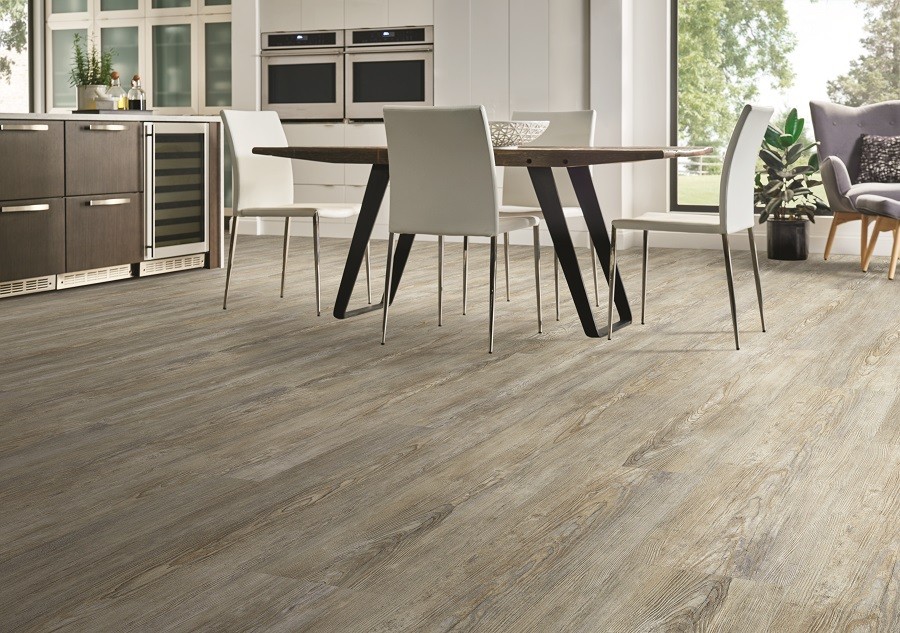Does Hardwood Belong in Your Kitchen?

How do you use hardwood in the kitchen?
Hardwood flooring is one of the most beautiful, luxurious, and in-demand flooring options out there. Its sophistication and ability to last for generations if properly cared for can make it an ideal flooring choice in rooms throughout the home.
One room in homes, however, that hardwood flooring is not typically considered ideal is in the kitchen. In a room with so much activity, so much foot traffic, and the likelihood of food and drink spills occurring the chances of your beautiful hardwood getting damaged or harmed in some way increases.
However, there are some homes where the entire aesthetic and style is built around the look and feel of hardwood, whether it is used prominently throughout the rest of the home or they are looking to maintain a rustic style in their kitchen. In those cases, there may be tremendous temptation to find a way to incorporate hardwood into their kitchens.
This begs the question: does hardwood belong in your kitchen? And, if so, how is one able to use it in the best way possible? While the perception may seem that hardwood doesn’t belong in the kitchen, you may be surprised to learn that there are indeed ways to incorporate this much-desired flooring into your kitchen.
Engineered Hardwood
Ok, so here is the unfortunate truth: natural, authentic hardwood flooring is not kitchen-friendly. It is prone to water damage and has a maintenance demand that does not make it ideal for a busy room like the kitchen. However, engineered hardwood flooring is the answer to using hardwood in the kitchen you have been looking for!
While the term “engineered” may make you think this isn’t a “real” hardwood option, engineered hardwood is in fact made from real wood, just like natural hardwood. The difference is that under that initial layer, it isn’t just a block of hardwood and is instead multiple thin layers of wood all glued together. This structure design has much more durability, stability, and sustainability than natural hardwood, meaning it is not only much easier to care for but also much more resilient and much easier to install (making it a more budget-savvy hardwood choice).
Engineered hardwood has much more moisture resistance, so any spills or accidents that may occur can be cleaned more easily without lasting damage. And, while you shouldn’t go stomping around on it with your heavy work boots, engineered hardwood is also more resilient to the little scrapes and scratches that can occur because of the heavy activity that normally happens in your kitchen.
Best of all, because engineered hardwood is still hardwood, you get all this strength and resistance while still keeping that authentic hardwood feel and all the styles that come with it. You can find engineered hardwood in any finish, color, or kind of wood you desire so your kitchen can blend seamlessly into the rest of your home.
Resilient Plank
As wonderful as engineered hardwood is, it is however still natural hardwood and not completely resistant to water, scuffs, and scratches. So for many, even though it is far more durable than natural hardwood, they still feel timid about using engineered hardwood in their kitchens.
This is an understandable stance. After all, you want the hard surface floors in your home to last a long time! That is why there is another, in some ways even more ideal, option for bringing the look and feel of hardwood into your kitchen: resilient plank!
Resilient plank, also known as luxury vinyl plank (LVP), is a manufactured hard surface flooring alternative that mimics the look and feel of hardwood flooring. Resilient plank is actually made from a large stack of compressed vinyl layers that, like engineered hardwood, helps give it stability and durability.
But, since there is no actual wood in LVP, most resilient plank options are completely waterproof! Water and food spills on resilient plank can be cleaned in a breeze, making it one of the absolute best kitchen flooring options out there for anyone wanting to emulate the look and feel of hardwood in a kitchen. Not only does it have moisture resistance, but it will also withstand the wear and tear you’ll be putting on your kitchen floor. Would you expect anything less from a flooring style called resilient?
So, contrary to popular belief, there is in fact a place for hardwood flooring in your kitchen. All you have to do is decide if you want something closer to natural hardwood that requires a bit more care or something that looks the part 100% and can stand up a little bit stronger.
If you are wanting to introduce hardwood into your kitchen but don’t know where to start, the team at Tish Flooring is ready and able to help you figure out exactly what you need! Our Indianapolis location carries a large range of engineered hardwood and resilient plank from the best providers in the country.
With our free in-home estimates and consultations, we can provide you with samples for you to choose from and see exactly how they look and feel in your space before you make any decisions. Call 317-879-8474 (TISH) today or schedule your free appointment online.

